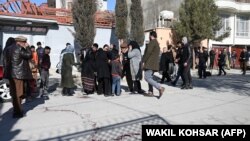The families of two Afghan female Supreme Court judges assassinated in the capital, Kabul, have accused the authorities of failing to provide adequate security for the officials.
Qadria Yasini, 53, and Zakia Herawi, 34, were heading to their office when unidentified gunmen opened fire on their vehicle on January 17.
Their driver was wounded in the attack, the latest in a string of targeted killings that have swept the country.
Yasini’s brother, Mohammad Amin Yasini, said on January 18 that the family was blaming security services and the Supreme Court for "failing" to take measures to protect officials.
"Sending judges with one driver and a car is not secure while threats [against officials] has greatly increased. They should have been provided full safety," he told TOLOnews.
Similar criticism was voiced by Herawi’s brother, Haji Mustafa Herawi, who claimed the government "has absolutely failed to protect the people."
"Where is the security?" he said in an interview with the AFP news agency.
Herawi’s mother Zia Gul urged the government to "wake up” and "take care" of the Afghan people.
No one claimed responsibility for the January 17 attack, and a Taliban spokesman said the militant group wasn't responsible.
Afghan and U.S. officials have blamed the Taliban for targeted killings that have swept the country in recent months.
Many of those being targeted are civilians -- journalists, rights activists, cultural figures, moderate religious leaders, and women in public roles.
The United States condemned the assassinations of the two female judges, saying the Taliban "should understand that such actions for which it bears responsibility outrage the world and must cease if peace is to come to Afghanistan."
Shaharzad Akbar, head of the Afghanistan Independent Human Rights Commission, said the country was "losing one of its most important gains, its educated & professional cadre, in what seems to be a systematic massacre & the world seems to be just watching."
Families Of Slain Afghan Female Judges Accuse Authorities Of Failing To Provide Security
- By RFE/RL

Editors' Picks
Afghanistan/Pakistan Trending
1
Romanian Village Evacuated After Russian Drone Strikes LPG Ship In Danube
2Ukraine Strikes Petrochemical Plant Deep Inside Russia Amid Escalating Long-Range Attacks
3Zelenskyy Vows Energy Sector Overhaul, Signs Gas Deal With Greece
4Ukrainian Battalion Officer Held After Russian Strike Killed 19 During Ceremony
5Russia Hits Ukraine With Overnight Attack As Fighting Intensifies in Pokrovsk
6Trump And Central Asia Reach Critical Minerals Deal At Washington Summit
7Ukraine's Energy Sector Under Investigation By Anti-Corruption Watchdog
8Radio Free Europe/Radio Liberty's Hungarian Service Ceases Operations
9'Weekend Snipers' Claims Reopen Wartime Trauma In Sarajevo
10Polish PM Tusk Says Railway Explosion 'Act Of Sabotage'
RFE/RL has been declared an "undesirable organization" by the Russian government.
If you are in Russia or the Russia-controlled parts of Ukraine and hold a Russian passport or are a stateless person residing permanently in Russia or the Russia-controlled parts of Ukraine, please note that you could face fines or imprisonment for sharing, liking, commenting on, or saving our content, or for contacting us.
To find out more, click here.








